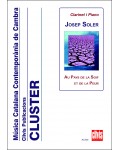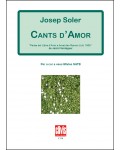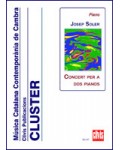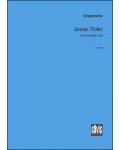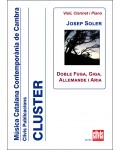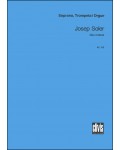
No products
Prices are tax included
Product successfully added to your shopping cart
There are 0 items in your cart. There is 1 item in your cart.
- English
- Castellano
- Català
Josep Soler i Sardà was born in Vilafranca del Penedès in 1935. His musical apprenticeship began here with Rosa Lara, and would continue in Paris with René Leibowitz (1960), and in Barcelona with Cristòfol Taltabull (1960-1964). He has received the “Montecarlo’s Opera Award” (1964), the “Ciutat de Barcelona Award”, twice (1962 and 1978), and the “13rd. Òscar Esplà Award”. His opera Edip and Yocasta premiered in the Gran Teatre del Liceu, in 1986.
In his works, very influenced by the music of Schönberg and Alban Berg, he generally uses the dodecaphonic technique in an expressionistic and impressionistic style, while at the same time becoming more austere and simple.
In the bibliographic world, Josep Soler has written numerous articles and books. From 1977 until 1982, he was a professor of History and Aesthetics at the Barcelona City’s Superior Music Conservatory, and until 1985, a music professor at the same institution. He is currently Director of the Badalona’s Professional Music Conservatory, and Numerary Academician of the Sant Jordi’s Royal Catalonian Academy of the Arts, in Barcelona.
-
-
Au pays de la soif et de la peur
Edition: DigitalThe work Au pays de la soif et de la peur is wonderfully expressive and unfolds in slow movements, making use of the full breadth of the two instruments’ ranges. Although he does not seek virtuosity, the performance of the work demands the utmost of performers, and above all, requires an extreme rapport.
10,01 € -
Au pays de la soif et de la peur
Edition: PrintedThe work Au pays de la soif et de la peur is wonderfully expressive and unfolds in slow movements, making use of the full breadth of the two instruments’ ranges. Although he does not seek virtuosity, the performance of the work demands the utmost of performers, and above all, requires an extreme rapport.
17,20 € -
Cants d'amor
Edition: PrintedThe Love Songs reflect the vocal music that Soler wrote between 2011 and 2013
26,00 € -
Cants d'amor
Edition: DigitalThe Love Songs reflect the vocal music that Soler wrote between 2011 and 2013
18,15 € -
-
-
Concert per a dos pianos
Edition: PrintedThe expression of Soler’s music takes the lead in each bar of the work. The priority the author gives to the expressive act translates into a large number of precise indications for the interpreters which go from pianissimo with four ps, to fortissimo with four fs, notes on the phrasing (even fingerings), and the search for concrete sounds and textures.
15,60 € -
Concert per a dos pianos
Edition: DigitalThe expression of Soler’s music takes the lead in each bar of the work. The priority the author gives to the expressive act translates into a large number of precise indications for the interpreters which go from pianissimo with four ps, to fortissimo with four fs, notes on the phrasing (even fingerings), and the search for concrete sounds and textures.
9,08 € -
-
-



